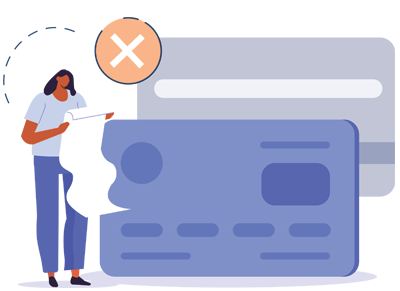Florida Bankruptcy Attorney
FOCUSING ON BANKRUPTCY, TAX, AND STUDENT LOAN RELIEF
When the stresses of unpaid bills get worse with each passing day and you wonder whether you can keep a roof over your head or the car you need for work, turn to a Florida bankruptcy attorney for help. Rather than guessing about what relief you might get in bankruptcy and what bills you may still owe after you file, talk to me. When you work with me, I can help you protect your most important assets, and I will explain all of your options so you can get debt relief quickly.
Be selective about which attorney you choose. It’s important to work with an experienced bankruptcy lawyer who knows Florida laws inside and out. If you have student loans, you need an attorney who understands each repayment plan as well as paths to possibly discharging that debt. Perhaps you need advice on issues related to unpaid or past due taxes. IRS rules are complex, and any missteps could cost you money and time. I have detailed knowledge and extensive experience in all of these areas. I will make sure you know the best possible path to getting your much needed debt relief.
If you’re buried under the burden of bills you can’t pay, I will help you. Whether you are worried about credit card debt, medical bills, student loans, or past-due taxes, those worries can be put to rest. Relieve your financial burdens, get a fresh start, and look to a brighter future.
Why Hire Attorney Lewis Roberts?
LET’S FIX IT! WAYS I CAN HELP.
The weight of debts you can’t pay means you carry financial stress in your every waking moment. It’s time for that to end. I can help you find solutions and relieve your worries.
With more than 20 years of experience helping people get out from under the burden of debt, I can present you with a range of options tailored to your situation. Count on me to advise you about any matter related to debts, to identify which options are appropriate for you and why. I will explain carefully and clearly what path you can take to debt relief so that you will make the best decision for your future.
Lewis Roberts, PA: Trust in my experience. Depend on my knowledge. Count on my compassion.
There are several advantages to working with me. As soon as we begin working together, you can refer all calls from your creditors to me; no more creditor harassment. I will handle all communications with your creditors going forward. I’ll be thorough in researching your full credit history, so we include all possible debts in a bankruptcy proceeding. And years down the line, if you need something from me related to your bankruptcy filing or your creditors, just call. I’m always happy to help. Not all bankruptcy attorneys are created equal. You need to feel comfortable and confident that your attorney will handle your matter with attention and care.

Let’s Fix It!
I am an attorney focused on solutions. I’ll plot the best path forward to relieve your burden of debt and will be by your side through the entire process. I’ll address all your needs, whether that’s guidance on what type of bankruptcy to file, what arrangements you can make to repay student loans in an affordable way, or how you can work with the IRS to address your tax debts. Let’s fix your financial past and focus on your financial future.
get help from LewisGet Help With
I Make It Easy
YOU NEED A LAW FIRM FOCUSED ON YOU AND YOUR FUTURE
Everyone’s financial situation is unique. I will spend time with you to learn exactly what financial burdens you have and to determine what solutions will be ideal for you. I will explain the advantages and disadvantages of the options before you and will help you choose the best path to debt relief. Once a plan is set, I will handle all the work for you. I will communicate with your creditors, I will handle all legal filings, and I will guide you every step of the way.
Work with Lewis Roberts, PA and know a better, less stressful financial future awaits you. Get the help you need today.

Bankruptcy FAQs
For many of my clients, one of the first questions they ask me is “If and when I file bankruptcy, will I lose my home?” It may reassure you to know that you don’t necessarily have to lose your home. If it is in the process of foreclosure, filing bankruptcy will put an immediate stop to the foreclosure. This is true whether you file Chapter 7 or Chapter 13. If you’re filing Chapter 7, you can enter a reaffirmation agreement to continue with your mortgage payments and keep your home.
Another option is the Mortgage Modification Mediation program, available if you file Chapter 13. With mortgage modification, you can negotiate a new mortgage agreement with your lender, but there are some qualifications you must meet, and there are some added mediation fees.
Because so many options are available and the direction you take depends on your unique circumstances, I recommend discussing your situation with me for guidance on which options are available and what may best serve you.
In addition to the worry about keeping their home, almost all my clients are concerned that they might lose their car when they file bankruptcy. Chances are, you will keep your vehicle, but the answer to this question depends on your situation in terms of the size of your payments, your income and whether the payments on your vehicle loan are current. If you file Chapter 7, you may want to enter a reaffirmation agreement, but it will need to be approved by the court. A judge may not approve it if the terms are not feasible for you.
If you file Chapter 13, you may be able to reduce your payments, get a lower interest rate, or both, when you reaffirm your car loan under Chapter 13. If you’re facing repossession of your car, or it has already been repossessed, you may not want to use bankruptcy to keep it or to get it back. That route usually puts you in a worse financial situation. Decisions about when to declare bankruptcy and which chapter to file under are often more complicated than most assume. That’s why you can count on my guidance. I’ll be sure you understand all your options to keep your vehicle, or to let it go.
By the time you have a wage garnishment, you are in a difficult position. If a creditor is garnishing your wages, your inability to pay those debts means you will now struggle to keep up with essential payments, like your car and mortgage or rent. There is a fast way to end garnishment: bankruptcy. As soon as you file, the garnishment will stop immediately. Ideally, you would talk to your bankruptcy attorney before the garnishment happens so you can avoid it altogether. But if you’re already being garnished, call me today. I will expedite your case so that we can get your bankruptcy filed as quickly as possible.
While I’d like to give you good news here, the chances of your student loans’ being discharged in bankruptcy are low. That doesn’t mean it’s not possible. You simply have to meet very narrow criteria to qualify for discharge. However, there are a range of repayment options, and you may not know all those that are available to you. Even if you can’t bankrupt your student loans, you may be able to reduce your payments. Depending upon your employer, you may even qualify for loan forgiveness after 10 years.
I will provide you guidance on what repayment plan makes the best financial sense for you. If your situation puts you in the very rare category of people who can discharge their student loans in bankruptcy, I’ll be the first one to tell you.
Before you make assumptions about how your bankruptcy will proceed and what debts will be wiped clean, you should consult with me about the details of your financial situation. I will explain your options and let you know which form of bankruptcy seems best for you. For personal bankruptcy, you may file Chapter 7 or Chapter 13. For businesses, there are other options.
As an individual, when you file Chapter 7, any debts you don’t reaffirm will be discharged. Don’t assume filing bankruptcy will be all that harmful to your credit. Chances are good you’ve already fallen behind on payments and your credit record is in bad shape. Your bankruptcy will stay on your credit record for up to 10 years, but you can also start building back your credit score shortly after you file. Once you file, you’ll have a chance to selectively take on small credit lines to build back a strong record and, in several years, you may have a strong credit score. Many people are usually above 720 in under a year after filing.
Filing Chapter 13 means you still pay your portion of your bills for three to five years after you file, so it is often termed a “reorganization” of your debts. Under this plan, you would consolidate all your bills and have only one payment that covers them all. Then, you’ll make payments for three to five years. After that time period has passed, most remaining debts will be wiped clean.
Why would you choose Chapter 13 where you still need to make payments for several years instead of filing Chapter 7 where payments end as soon as the bankruptcy takes effect? It depends on your assets. If you have valuable assets that wouldn’t be exempt in bankruptcy, choosing Chapter 13 route will allow you to protect your assets. It also depends on your income. A bankruptcy means test will help you know if you can qualify for Chapter 7. Some of my clients make too much money, so Chapter 7 is not an option for them. I can help you understand the means test and advise you if you have a choice on which chapter to file. If you do, I’ll let you know which one will best fit your situation.

Don’t Just Take
My Word For It…
When you see how I’ve helped my clients, you’ll understand why so many of them recommend me to others who need debt relief. Learn about how I have compassionately guided clients to a future with less stress and more financial freedom.
testimonials



